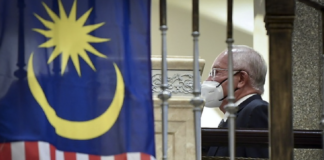DAVOS, Switzerland, Jan 20 – The global economy is moving from normalization seen at the end of last year, to a new “non-normality”, according to Christine Lagarde, president of the European Central Bank (ECB).
Speaking at a panel discussion on the global economic outlook on Friday at the World Economic Forum (WEF) in Davos, Switzerland, Lagarde said there are indications that consumption, usually a driving force for growth, is not as strong as it used to be.
She attributed this trend to dwindling savings in practically all advanced economies, representing a drop from 10 percent to “virtually zero.”
According to the latest Chief Economists Outlook released by the WEF, 56 percent of chief economists expect the global economy to weaken in 2024, while a strong majority have predicted loosening labor markets and financial conditions in the coming year.
Trade, however, is starting to normalize, according to Lagarde. “Trade went down and was massively disrupted…in the two years preceding 2023, but it is beginning to really pick up,” Lagarde said. She added that in October, global trade numbers were up for the first time in many months.
Another sign of normalization is that – except for the euro area – headline inflation and core inflation are coming down globally.
Germany Finance Minister Christian Lindner acknowledged the economic difficulties his country is currently facing after a long period of strong growth.
The eurozone’s largest economy contracted by 0.3 percent last year amid persistent inflation, high energy prices and weak foreign demand.
Lindner, however, refuted claims that Germany is the sick man of Europe, saying it is only “a tired man” who needed a “good cup of coffee, which means structural reforms.”
He said that the year 2023 was “a call for action” and said challenges include the rise of artificial intelligence and the threat of fragmentation in the global economy.
World Trade Organization (WTO) Director General Ngozi Okonjo-Iweala expressed concerns about political developments in the Red Sea area and the Suez Canal, as well as the Panama Canal which has been reeling from the effects of climate change.
She said goods trade was considerably down in 2023, forcing the WTO to revise its forecast from 1.7 percent to 0.8 percent. In the last quarter of 2023, however, trade showed a recovery, led by automobiles, components and parts.
“We have been more optimistic about 2024, forecasting a considerable recovery to 3.3 percent. We may be moving towards normalization but not normal because trade growth is still trending below GDP growth,” she noted.
But looming uncertainties have made forecasting difficult, she said.
“However, I will take a bit of a risk and say that 2024 will be better than 2023 unless a major war breaks out, then all bets are off,” Okonjo-Iweala said.
According to Singaporean President Tharman Shanmugaratnam, the biggest challenges to resilience are the slowly happening changes that threaten in a far more fundamental way. These included the shift in the global ecological balance, the aging of societies “which we are by and large not prepared for”, and the gradual shift towards polarization.
In his closing remarks on Friday, WEF President Borge Brende called for global cooperation to fight today’s challenges. “In an uncertain and challenging time, one thing is clear: we can shape a more resilient, sustainable and equitable future, but the only way to do so is together.”
Entitled “Rebuilding Trust,” the five-day WEF annual meeting focused on four priorities: achieving security and cooperation in a fractured world; creating growth and jobs for a new era; harnessing artificial intelligence as a driving force for the economy and society, and formulating a long-term strategy for climate, nature, and energy.
















